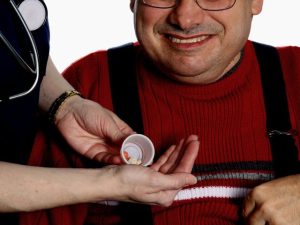Nursing Interventions for Refusing Medical Treatment
There are several interventions a nurse can implement to support the patient who is refusing medical treatment, specifically medication.
Ensure you are approaching the patient with a friendly, calm demeanor is helpful when administering medications. Administering medications in a private and quiet location also makes it likely the patient will be more receptive to taking the medication.
It is important to explain all the medications you are administering to the patient and that they have an understanding of what the medications were prescribed. If they have any additional concerns or questions be sure to address those as well. Reluctancy to answer their questions or provide additional information can cause a greater distrust in you as a nurse and are more likely to refuse.
If the patient is in an aggravated mental state and is not receptive to taking medication, it is ok in some cases to walk away and try again later when the patient calms down. Keep in mind if the medications are time sensitive and if another attempt later is possible.
Extra patience when administering medications to the elderly and those with memory loss or other psychiatric conditions is also helpful. Elderly patients may take longer to swallow the medicine especially if they are on several medications.
To assist the elderly patient, it can be helpful to provide additional water or another drink unless it is contraindicated for the medications prescribed.
If the patient is still having trouble with swallowing, you may be able to discuss switching to liquid forms of the medications with the physician. Some medicines may not be available in liquid form, but other solutions may be available.
Medications often have several possible side effects and if the side effects are affecting the patient’s quality of life a nurse can discuss any possible alternatives or solutions to troubling medications with the patient’s physician.
If a medication is to be administered as an injection, be sure you are using the right size needle. Using too large of a needle for a patient may cause additional pain and cause a negative experience for the patient.









